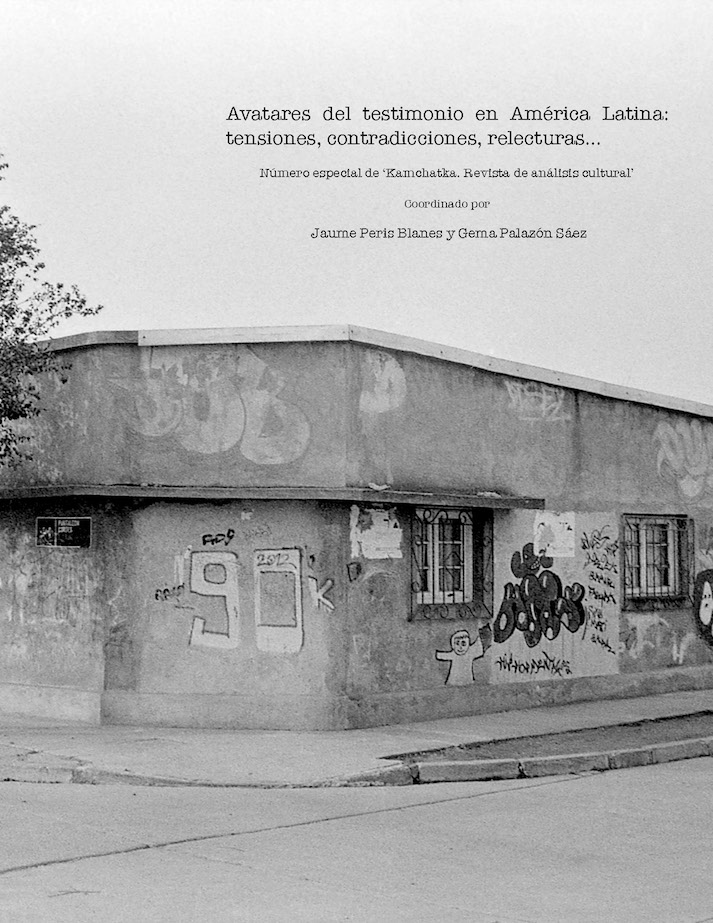Camino a la paz: repertorios simbólicos testimoniales de una nación en transición
DOI:
https://doi.org/10.7203/KAM.6.7279Keywords:
Colombia, Memoria, Reparación, Escritura colectiva, Crímenes de Estado Abstract
Abstract
Resumen:En Colombia se han dado en los últimos años una variedad de repertorios simbólicos de memorias del trauma que ha vivido el país como resultado del conflicto armado. Estos repertorios se manifiestan en diversas expresiones culturales y estéticas con el fin de interpelar y transformar las experiencias sufridas por las víctimas de la violencia. Son prácticas de reparación y resistencia como antídoto contra la impunidad y el olvido. En este ensayo se propone que los repertorios simbólicos son las nuevas formas del testimonio del siglo veintiuno. Dichos repertorios se apropian de los métodos y estrategias del testimonio para expresar una urgencia y una solidaridad hacia un objetivo común, la del clamor por la paz y la reconciliación con justicia social.
Palabras clave: Colombia, repertorios simbólicos, performance, testimonio.
Abstract:Colombia has seen in recent years the surge of a variety of symbolic repertoires from traumatic memory experienced by the country as a result of the armed conflict. These repertoires compose diverse aesthetic and cultural expressions that challenge and transform the experiences suffered by the victims of violence. These are practices of reparation and resistance as an antidote against impunity and oblivion. This essay proposes that the symbolic repertories are the new forms of testimony of the twenty-first century. The symbolic repertoires appropriate the methods and strategies of the testimony genre to express an urgent need and a solidarity toward a common goal, the clamor for peace and reconciliation with social justice.
Key words: Colombia, symbolic repertoires, performance, testimony
 Downloads
Downloads
 References
References
Bibliografía AFAVIT (2009). “La memoria: una apuesta por la vida y la dignidad”. Briceño et al. Recordar el conflicto: iniciativas no oficiales de memoria en Colombia. Bogotá, ICTJ: 43- 72. Beverly, John (1996). “The Real Thing”. The Real Thing: Testimonial Discourse an Latin America. George Gugelberger (ed.). Durham & London: Duke University Press: 266-287. Butler, Judith (2001). El grito de Antígona. Trad. Esther Oliver. Barcelona: El Roure. Castrillón, Gloria. “Las tejedoras de Mampuján: La fuerza femenina del perdón”. Revista Cromos. Bogotá (Lunes, 16/03/ 2015). CNRR. Grupo de Memoria Histórica (2009). Memorias en tiempos de guerra: Repertorios de iniciativas. Bogotá: Puntoaparte eds. Das, Veena (2008). Sujetos del dolor, agentes de dignidad. Francisco Ortega (ed). Bogotá y Medellín: Universidad Javeriana, Instituto Pensar, Universidad Nacional de Colombia y Facultad de Ciencias Humanas –CES. Jelin, Elizabeth (2002). Los trabajos de la memoria, España: Siglo Veintiuno. Kaminski, Amy K. Reading the Body Politic: Feminist Criticism and Latin American Women Writers. Minneapolis: University of Minnesota Press. López Baquero, Constanza (2012). Trauma, memoria y cuerpo: El testimonio femenino en Colombia. Tempe: Asociación Internacional de Literatura y Cultura Femenina Hispánica- AILCFH. Reátegui Carrillo, Félix (2009). “Las víctimas recuerdan: Notas sobre la práctica social de la memoria”. En Briceño et al eds. Recordar el conflicto: iniciativas no oficiales de memoria en Colombia. Bogotá, ICTJ: 17-43. Rodríguez, Rosana P. “El poder del testimonio: experiencias de mujeres”. Revista de Estudios Feministas. 21.3 (2013): 1149-1169. Satizábal, Carlos (2014 ). “Memoria poética”. Bogotá (manuscrito inédito). Satizábal, Carlos (2015 ). “Antígonas Tribunal de Mujeres: memoria política y conflicto en Colombia”. Bogotá (manuscrito inédito). Taylor, Diana (2003). The Archive and the Repertoire: Performing Cultural Memory in the Americas. Durham and London: Duke University Press. Todorov, T. (2000). Los abusos de la memoria. Trad. Miguel Salazar. Barcelona: Paidos Ibérica. Uribe, María Victoria (2009). “Iniciativas no oficiales: un repertorio de memorias vivas”. En Briceño et al, eds. Recordar el conflicto: iniciativas no oficiales de memoria en Colombia. Bogotá, ICTJ: 43- 72. Yúdice, Geroge. “Testimonio y concientización”. Revista de crítica literaria latinoamericana 18.36 (1992): 221-32.
Downloads
Published
How to Cite
-
Abstract888
-
Artículo (Español)483
Issue
Section
License

This journal provides an immediate free access to the content on the principle that freely make investigation available to the public, which promotes an increased global knowledge exchange.
Unless otherwise indicated, texts published in this journal are under the license Attribution-NonComercial 4.0 by Creative Commons. These texts may be copied, distributed and publicly communicated whenever the publication’s author and title are quoted and whenever they are not used for commercial purposes. In any case, intellectual property of the articles and its potential economic rights entirely belong to its authors.
The full license can be consulted on https://creativecommons.org/licenses/by-nc/4.0/. We encourage authors to disseminate papers published in Kamchatka. Journal of cultural analysis electronically, in institutional digital repository or in their websites.





